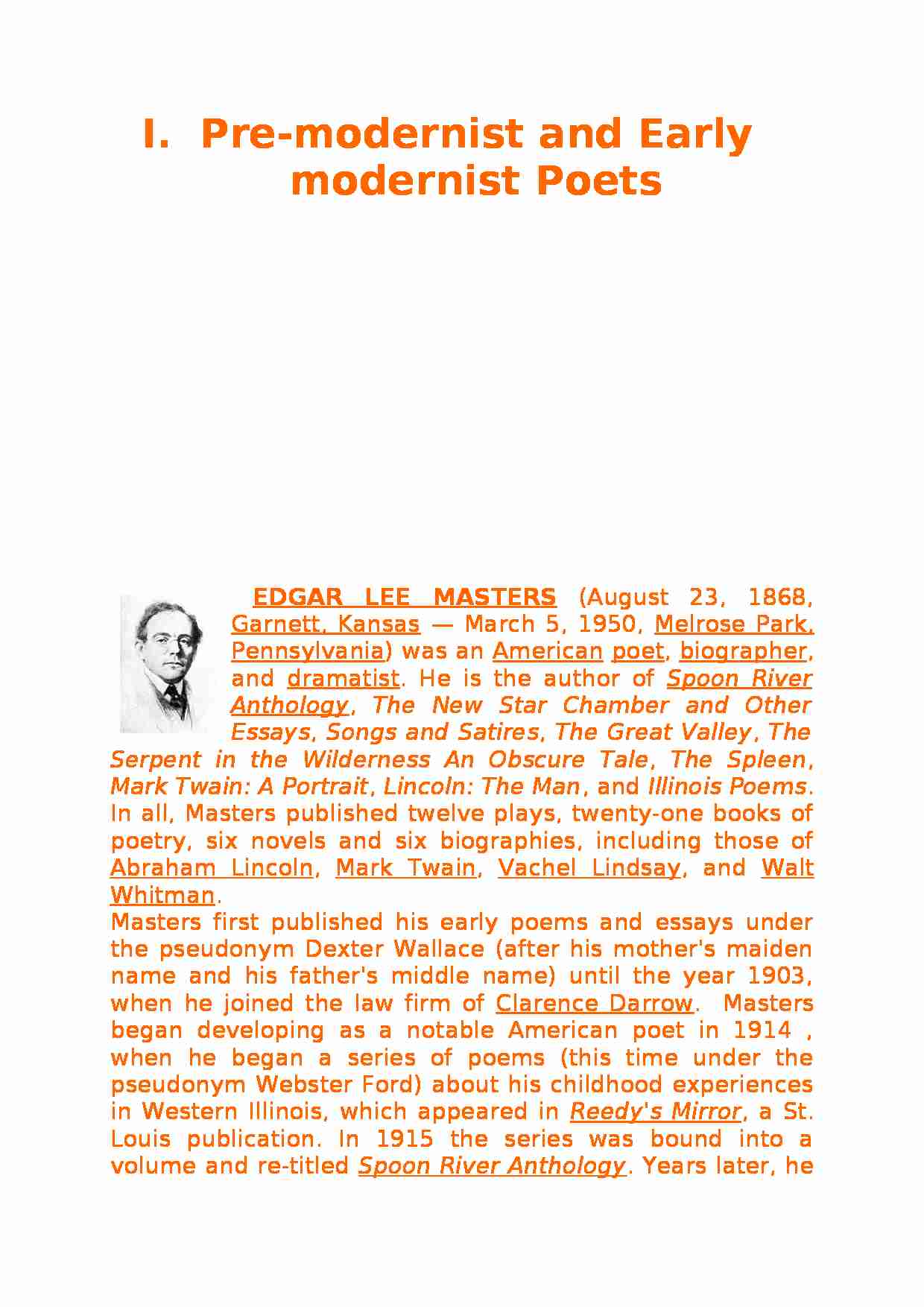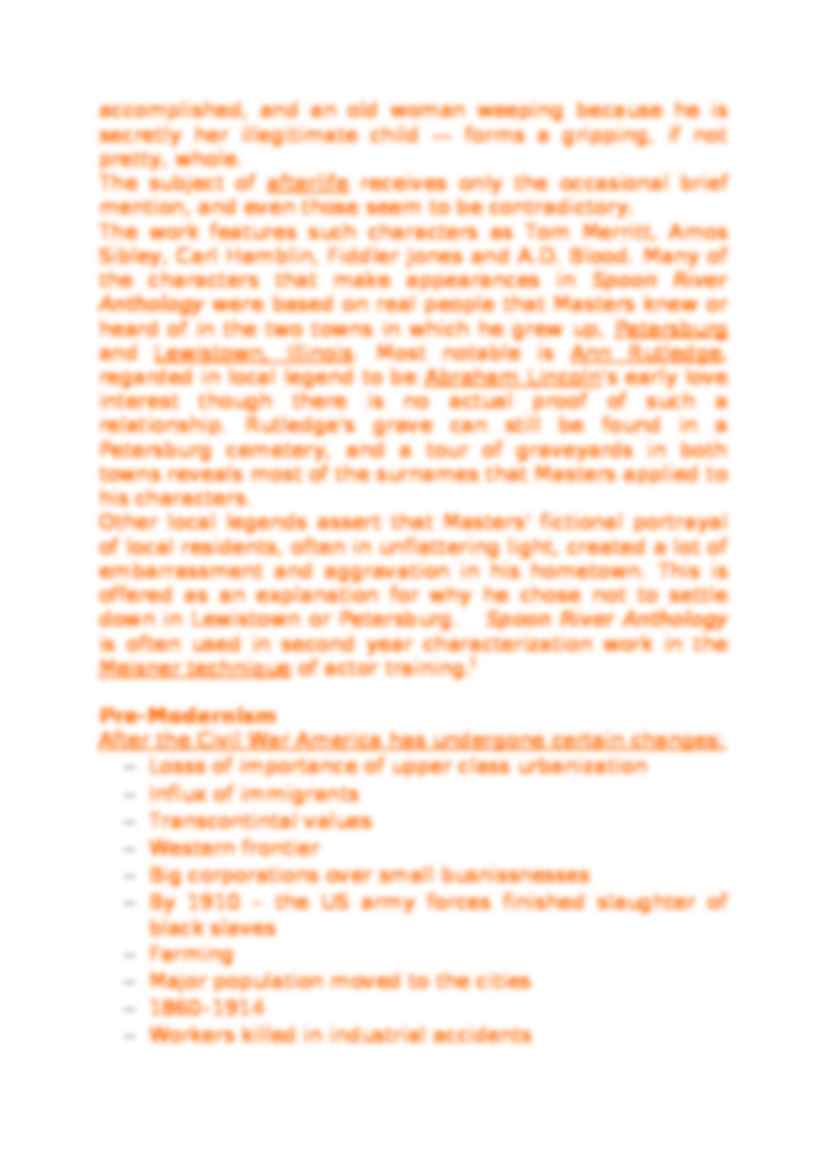Pre-modernist and Early modernist Poets
Edgar Lee Masters (August 23, 1868, Garnett, Kansas — March 5, 1950, Melrose Park, Pennsylvania) was an American poet, biographer, and dramatist. He is the author of Spoon River Anthology, The New Star Chamber and Other Essays, Songs and Satires, The Great Valley, The Serpent in the Wilderness An Obscure Tale, The Spleen, Mark Twain: A Portrait, Lincoln: The Man, and Illinois Poems. In all, Masters published twelve plays, twenty-one books of poetry, six novels and six biographies, including those of Abraham Lincoln, Mark Twain, Vachel Lindsay, and Walt Whitman.
Masters first published his early poems and essays under the pseudonym Dexter Wallace (after his mother's maiden name and his father's middle name) until the year 1903, when he joined the law firm of Clarence Darrow. Masters began developing as a notable American poet in 1914 , when he began a series of poems (this time under the pseudonym Webster Ford) about his childhood experiences in Western Illinois, which appeared in Reedy's Mirror, a St. Louis publication. In 1915 the series was bound into a volume and re-titled Spoon River Anthology. Years later, he wrote a memorable and invaluable account of the book's background and genesis, his working methods and influences, as well as its reception by the critics, favorable and hostile, in an autobiographical article notable for its human warmth and general interest.
Turnaway from Romanticism
“Amanda Barker”
“Frank Drummer”
“Elsa Wertman”
“Hamilton Greene”
“Editor Whedon”
“Lucinda Matlock”
„Spoon River Anthology”
Poem spoken by fictious character
The Dramatic Monologue - poet avoided suspension that speaker was a character in unnamed drama
Poet - unemotional
Emotional detachment
Collecting monologues
Fragmentary fiction
Why authors used this connection PRE-MODERNISM
Loss of intent in individualism
Realistic connection in fiction (Dreiser, Twain)
Unnamed sense of yearning
Emotional void
Each following poem is an epitaph of a dead citizen, delivered by the dead themselves. They speak about the sorts of things one might expect: some recite their histories and turning points, others make observations of life from the outside, and petty ones complain of the treatment of their graves, while few tell how they really died. Speaking without reason to lie or fear the consequences, they construct a picture of life in their town that is shorn of
(…)
… down in Lewistown or Petersburg. Spoon River Anthology is often used in second year characterization work in the Meisner technique of actor training.[
Pre-Modernism
After the Civil War America has undergone certain changes:
Losss of importance of upper class urbanization
Influx of immigrants
Transcontintal values
Western frontier
Big corporations over small busnissnesses
By 1910 - the US army forces…
… chanted. His numerous correspondences with the poet Yeats detail his intentions to revive the musical qualities in poetry as had been practiced by the ancient Greeks.Because of his identity as a performance artist and his use of American Midwest themes, Lindsay became known in the 1910's as the "Prairie Troubador." For the final 20 years of his life, Lindsay was one of the best-known poets in America. His reputation was high enough to enable him to befriend, encourage, and mentor other poets, such as Langston Hughes and Sara Teasdale. However, his poetry lacked elements that encouraged the attention of academic scholarship, and after his death he became an obscure figure.
Introduced African American rhythms
“The Congo and Other Poems”
Beginnings as a poet
While in New York in 1905 Lindsay turned…
... zobacz całą notatkę






Komentarze użytkowników (0)